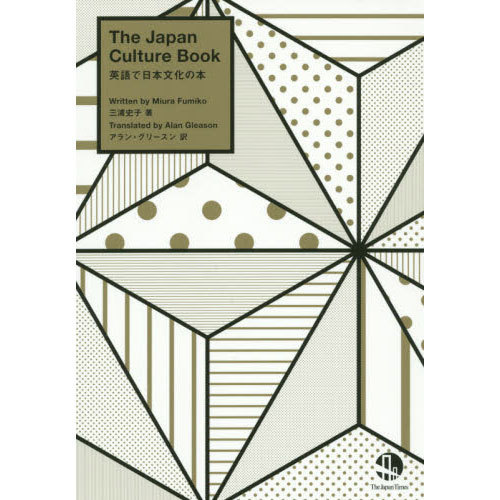May 1, 2015
Interview: Alan Gleason
Alan Gleason and Bilingual Book Translation
The Japan Culture Book. Written by Miura Fumiko; translated by Alan Gleason. The Japan Times, 2015. ISBN 978-4-7890-1580-6.
Alan tells us:
In addition to doing freelance translation projects like this book, I work as a writer, editor and translator (the archetypal SWET member, eh!) for the webzine Artscape Japan and the Books from Japan website. When I can I indulge my hobby of playing bass at various jazz venues around Tokyo. I am always happy to spam interested parties with notices of my gigs.
SWET asked Alan about the book:
 As a book intended for both Japanese and English readers, what sorts of cautions did you practice in translating?
As a book intended for both Japanese and English readers, what sorts of cautions did you practice in translating?
It was a very difficult book to translate because the author and publisher envisioned two different audiences: Japanese readers studying English (and perhaps hoping to chat about Japanese culture with English-speakers), and non-Japanese readers interested in Japanese culture. Because it was a "taiyaku" (bilingual) book, like many that the Japan Times publishes for educational purposes, on the one hand they wanted a translation as faithful as possible to the original Japanese on the facing page—if not word for word, at least sentence for sentence. On the other hand, they also wanted it to read smoothly in English for their potential non-Japanese readership. I explained that these two style requirements were mutually contradictory. I found myself arguing in favor of less literal, more idiomatic English wording, sort of as a self-appointed proxy for any English readers, while the author and editor, being Japanese, were constantly trying to rein in my more "iyaku" tendencies so that their Japanese readers wouldn't be flummoxed by too many unfamiliar idioms. In hindsight, I think maybe I should have resigned myself to a more literal approach, since it seems likely that the vast majority of readers will in fact be Japanese.
Did you work closely with the author? What were her particular concerns for the translation?
Yes, we worked very closely—it was an extremely time-consuming process. I know the author well and we are friends, but we had never worked on this sort of project together. She was very concerned, as I noted above, that the translation faithfully reflect the original Japanese. As is the case with many Japanese people who know some English, this meant that she went over my text with a fine-toothed comb and an E-J dictionary, and quizzed me about every nuance or idiomatic expression that seemed it might deviate from the original. To her credit she generally accepted my explanations. And, since she occasionally found a bona fide mistranslation in my work, I couldn't really get on a high horse about it and tell her to leave the English to me!
What with so much information available on the Internet about these topics on Japanese culture, what makes Miura-san's book particularly recommendable?
I think she has imbued it with her own considered and incisive point of view, which is, above all, highly skeptical of stereotypes and hype—not only how Japan is viewed from outside, but how vested interests in the country seek to present it. She emphasizes in her preface that she is not interested in promoting Japanese culture as some intrinsically unique and wonderful thing. She brings up a fair number of phenomena that you might consider unflattering to Japan, but she does it quite tactfully, and without sounding didactic.
Which items are you especially proud of? Or especially enjoyed working on? Or scratched your head over?
Despite the arduous aspects of the translation process, which had me frequently gritting my teeth, I'm pretty happy with the result, and gratified by the mostly favorable comments I've received about the book—though of course, those are all from friends of mine. I'm not particularly proud of my English prose in this book, but I feel like I did the best I could to find a balance between literal and loose translation. What I enjoyed most was the fact that it really is a kitchen-sink volume that touches on nearly every conceivable aspect of Japanese culture, past and present, so it's sort of like a mini-encyclopedia, from which I learned a lot. And I can testify to the author's meticulous fact-checking—she's a journalist by training—so the information in it is pretty darn accurate.
What had me scratching my head was not anything in terms of content, but the process. I wonder if it is possible to produce a bilingual book that really can please the two disparate readerships this one aspires to, and without all the blood and sweat this one entailed. I'd be interested in hearing from other translators of similar works.
It looks like a good book for first-time foreign students coming to Japan with a modicum of Japanese under their belts already—as it will give them a place to read about a topic in Japanese with the English nearby. Is the English quite different from the Japanese?
Now that’s a third target readership we hadn’t thought of! But why not indeed? It could certainly serve as a Japanese-language study guide for foreign readers—students who are encountering all these topics during their year abroad in Japan, say. Oddly, that particular audience never came up in our discussions of the book, and with hindsight, I wonder why. Per the above, the English is quite faithful to the Japanese, so they should be able to practice their Japanese reading skills on content they need to know, or are interested in, with easy reference to the equivalent English on the facing page.
Thank you for your insights on this project and we look forward to seeing your other projects, and taking advantage of the notices of your jazz gigs and other events.
